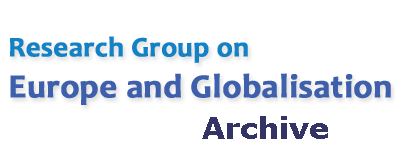
Home
This website is no longer maintained, but remains as an archive.
Developing since the end of 2008, the Research Group on Europe and Globalisation became a lively research community, bringing together researchers from different stages, coming from three faculties and about 15 subjects (amongst them: European Studies, French Studies, Geography, German Studies, Hispanic Studies, History, Law, Linguistics, Management, Philosophy, Politics, Religious Studies, Sociology, having contacts with Contemporary Arts and the Institute for Cultural Research)
Our main aim is to define non-particularistic approaches to conceptualising European society and, as such to develop an alternative to 'area studies', 'national comparison' and 'cosmopolitanism' as currently dominant research paradigms for representing Europe. In many of these approaches, 'Europe' is reified as a unifying, essentialising principle, exoticising it and its 'others' and, from the point of view of theory, causing the distinctiveness (sic.) of a given 'idea of Europe' to be sustained. Similarly, we distinguish our persepctive from approaches grounded in modernisation theory which represent Europe as a model for potential worldwide development (Held 2004).
Using the productive tension these ideas offer, our programme focuses on three fundamental principles underlying social theory as starting points for understanding Europeanisation. First, we apply the logic underlying Robertson's definition of 'glocalisation' (1992, 1995), viz. that universality and particularity are conceptually inseparable when theorising the social. This implies that while space and place continue to matter, specific, universal aspects of human co-existence govern the perspective from which Europe can better be understood. Thus, while acting as an object of study, Europe is simultaneously perceived as a heuristic or a means of validating a certain theory of society. Second, we generally follow Simmel's (1908) notion of 'sociation', which opens up the classic link between the 'nation-state' and 'its society'. This entails a process-orientated perspective, based on the dynamic concept of 'conflict' as further developed by Coser (1956), Hirschman (1997) and Dubiel (1998), which will be opposed to the perception of Europe as an 'empire of consensus' (Beck/Grande 2007). 'Conflict' thereby becomes a useful lense through which issues such as transnationalisation, work, legitimacy, participation, citizenship, memory, solidarity, borders or migration can be re-examined from a fresh theoretical perspective in a European context.
We warmly invite researchers and research students who are interested in our approach to contact us in order to sound and discuss possible exchange and cooperation with us or even inclusion into our Research Group!
Tel: +44 (0) 1524 592671

